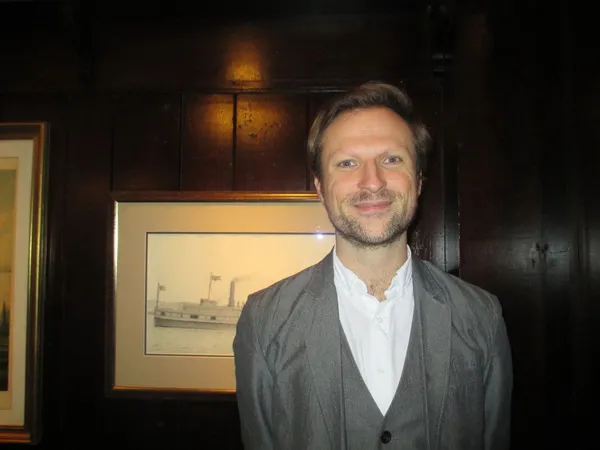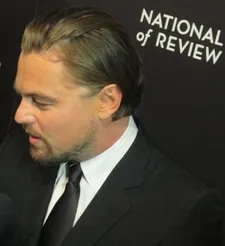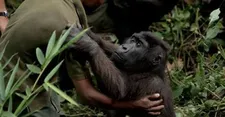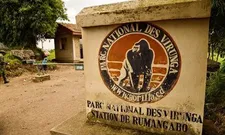 |
| Virunga director Orlando von Einsiedel; "What I can tell you is, good journalism requires that you put your allegations out there…" Photo: Anne-Katrin Titze |
Leonardo DiCaprio has come on board as executive producer for Virunga, Orlando von Einsiedel's documentary on the plight of Virunga Park Director Emmanuel de Merode and the mountain gorillas of the Congo. Von Einsiedel was feted by Netflix, with a luncheon this week in the Harbor Room of the 21 Club in Midtown Manhattan and gave me an update on where we are today.
Last week the New York Times published an article, called Oil Dispute Takes a Page From Congo's Bloody Past, on the struggles to keep Virunga National Park in the Democratic Republic of Congo safe from oil exploration at Lake Edward which falls in its boundaries. Virunga is Africa's oldest national park and a Unesco World Heritage Site.
![Virunga 21 Club Netflix Orlando von Einsiedel luncheon: "The big threat hanging over everything is this oil company [SOCO International].](/images/newsite/Virunga 21 Club luncheon_225.webp) |
| Virunga 21 Club Netflix Orlando von Einsiedel luncheon: "The big threat hanging over everything is this oil company [SOCO International]. Photo: Anne-Katrin Titze |
Anne-Katrin Titze: How did Leonardo DiCaprio come on board? That's excellent news for the reach of your film and Virunga National Park.
Orlando von Einsiedel: Well, he [Leonardo DiCaprio] saw the film. I think Ted Sarandos [chief content officer] from Netflix showed him the film early on and he got in touch and said 'how can I get involved and help out?' For us to have the world's biggest actor and also the world's biggest distributor get behind the project, to share the story of the rangers with the world, we're feeling incredibly blessed. Because we have the best chance to protect this park.
AKT: When we spoke earlier this year, Emmanuel had just been shot. How is he doing now?
OvE: He is back in the park. I mean, he was back in the park after 30 days. He remains as committed as ever and is doing his work along with the other rangers.
AKT: He is a remarkable presence - in the film and with the work he is doing. How are the mountain gorillas?
OvE: They're good. The orphans, André is looking after them. There's a new one, a baby one in there. The wild mountain gorillas, you know, their population is slowly increasing, very slowly. The big threat hanging over everything is this oil company.
AKT: What is the latest update on them?
OvE: They made an announcement in June that they were going to halt their operations. And we thought originally that was great news. It turns out it was almost meaningless. They just got to analyse their data. And if the data is positive, they might come back, who knows. The park remains still very much under threat and SOCO International is as bad as we thought they were.
 |
| Virunga executive producer Leonardo DiCaprio: "He got in touch and said 'how can I get involved and help out?'" Photo: Anne-Katrin Titze |
AKT: I hope very much it is going to help that more of the world is behind this.
OvE: Thank you very much.
When I spoke with Orlando von Einsiedel earlier this year, we received news on April 17 that Virunga's Park Director had been shot.
Anne-Katrin Titze: You said you just spoke to Emmanuel [de Merode - Virunga National Park Warden] and he is doing well?
Orlando von Einsiedel: He is doing well. Considering the circumstances, he is doing okay.
AKT: Can you talk at all about the disclaimer poster being put up at the press screening?
OvE: What I can tell you is, good journalism requires that you put your allegations out there and as part of that process you have to then incorporate their response into the product. Whether that's a newspaper article or TV show, you need to incorporate the response of people that you're alleging allegations against.
AKT: I exchanged e-mails with Simon Trevor this morning. I had recently interviewed him about his latest documentary White Gold on ivory poaching. Do you know who he is?
OvE: No.
AKT: He was a game warden at Tsavo National Park and second unit director on Sydney Pollack's Out Of Africa (1985) as well as on Michael Apted's Gorillas In The Mist (1988). I asked him if he had seen Virunga and he had not. Maybe you should get in touch with him. How did you get in contact with the people in your film, the French journalist, Melanie, for example?
 |
| On protecting Virunga's mountain gorillas: "This way you meet people who have been doing their own work, communicating with rangers." |
OvE: The park already had lots of concerns about the actions of SOCO International's contractors and supporters in the Congo. When I came along - I have a background in journalism and used to make a lot of investigative films - I heard about their concerns and wanted to find out more about it. So I started working with a variety of people, gathering evidence about what they were doing.
This way you meet people who have been doing their own work, communicating with rangers. And one day I met Melanie who was working in the region and she was interested in working with us and looking into this issue. Then it was a team effort. I was the lynchpin. I didn't want her to know about the other people and I didn't want them to know who she was. That was all about safety and security. So if anyone dropped some memory cards or hard drive it wouldn't trace back to anybody else.
AKT: It's obvious the danger you are all in. In many films you don't have that acute sense of danger. Do you sometimes wake up in the middle of the night and have doubt? Are you scared?
 |
| Virunga National Park: "Virunga is special not only because of the mountain gorillas but also the park can do so much to drive real development in the region." |
OvE: There were times when I was scared, but I can always walk away as a foreign journalist. If it got too much, I could pack my bag and leave. The rangers in the park, the local people can't. You draw inspiration from them.
AKT: It is such important work they are doing. This is the last place in the world where there are Mountain Gorillas. It is one of the most important issues we have - to protect this world. The structure of your film leads from protecting the animals to issues of humans at war.
OvE: I agree. And Virunga is special not only because of the Mountain Gorillas but also the park can do so much to drive real development in the region. And with development comes peace and stability. So the park is special not just because of the animals which are incredible but also because of what it can do to bring peace in a region which spent 20 years of war.
Virunga is one of the 134 documentaries submitted for the 87th Academy Awards short list.





















